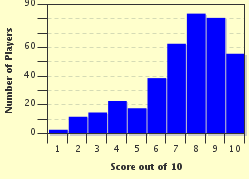Quiz Answer Key and Fun Facts
1. The "Arabian Nights" tales are framed as a series of stories (and stories within stories!) told by the clever Scheherazade. For what reason was she supposed to have told them?
2. In one of her tales, Scheherazade told of the poor man Ali Baba, who overheard the magical password that opened a cave of fabulous treasure stockpiled by forty thieves. What was this password?
3. One of the most famous translators of the "Arabian Nights" tales into English happened to share the name of a much more famous actor. What was his name?
4. Perhaps the best known of all Scheherazade's stories is the one about Aladdin and his magical lamp that can summon a genie to do his bidding - partly because of the popular 1992 Disney animated version. But the cartoon "Aladdin" differs in many ways from the traditional telling. Which is not one of these differences?
5. Scheherazade's tales are mainly fictional, but she does incorporate some real people into her stories. Who is the wise Caliph of Baghdad who figures in at least half-a-dozen "Arabian Nights" tales, often learning news of the common people in the marketplace through his Vizier, Ja'far?
6. Scheherazade's tales have inspired many films. Who played the swashbuckling title character in the 1924 film "The Thief of Baghdad"?
7. Scheherazade's character Sinbad the Sailor narrates the story of his own life over several connected tales. Among the movies that have been inspired by Sinbad's life story is a 1958 release that features a smorgasbord of special effects (like skeleton soldiers and giant monsters), which look crude today but were very exciting at the time. What's the title?
8. In his voyages, Sinbad the Sailor and his crew are attacked by a giant roc, which destroys their ship. What kind of a creature is a roc?
9. The influence of the Arabian Nights tales extends beyond literature. What 19th-century Russian composer is known for a suite titled "Scheherazade" that has become a standard of the classical orchestral repertoire?
10. The "Arabian Nights" stories have even inspired Broadway musicals. In what popular musical of 1953 would you hear the song "Gesticulate", which contains the following unforgettable rhyming lyrics: "Should Scheherazade/Undulate her body/That can be expressed/If you gest-i-cu-late"?
Source: Author
SBH
This quiz was reviewed by FunTrivia editor
kyleisalive before going online.
Any errors found in FunTrivia content are routinely corrected through our feedback system.

